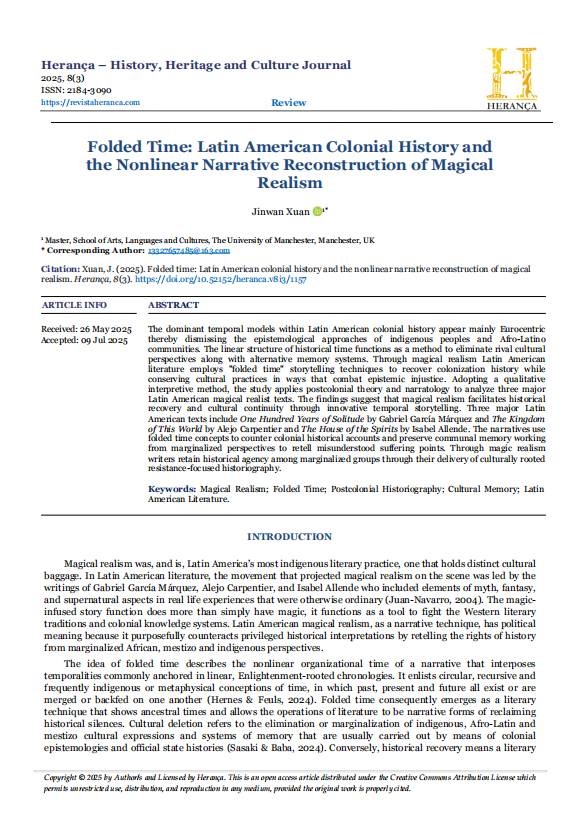Folded Time: Latin American Colonial History and the Nonlinear Narrative Reconstruction of Magical Realism
Keywords:
Magical Realism; Folded Time; Postcolonial Historiography; Cultural Memory; Latin American LiteratureAbstract
The dominant temporal models within Latin American colonial history appear mainly Eurocentric thereby dismissing the epistemological approaches of indigenous peoples and Afro-Latino communities. The linear structure of historical time functions as a method to eliminate rival cultural perspectives along with alternative memory systems. Through magical realism Latin American literature employs "folded time" storytelling techniques to recover colonization history while conserving cultural practices in ways that combat epistemic injustice. Adopting a qualitative interpretive method, the study applies postcolonial theory and narratology to analyze three major Latin American magical realist texts. The findings suggest that magical realism facilitates historical recovery and cultural continuity through innovative temporal storytelling. Three major Latin American texts include One Hundred Years of Solitude by Gabriel García Márquez and The Kingdom of This World by Alejo Carpentier and The House of the Spirits by Isabel Allende. The narratives use folded time concepts to counter colonial historical accounts and preserve communal memory working from marginalized perspectives to retell misunderstood suffering points. Through magic realism writers retain historical agency among marginalized groups through their delivery of culturally rooted resistance-focused historiography.
Downloads
References
Abdusharipovna, R. S. (2025). The magic of reality: Exploring magical realism in one hundred years of solitude. Journal of Advanced Scientific Research, 6(1). Retrieved from https://www.sciencesage.info/index.php/jasr/article/view/380
Astvaldsson, A. (2011). Myth, cultural memory and resistance in Latin American narratives. Bulletin of Hispanic Studies, 88(6), 617-633. https://doi.org/10.3828/bhs.2011.32
Cooper, S. E. (2008). Family systems and national subversion in Isabel Allende’s “The House of the Spirits.” Interdisciplinary Literary Studies, 10(1), 16-37.
Earle, P. G. (1987). Literature as survival: Allende’s “The House of the Spirits.” Contemporary Literature, 28(4), 543. https://doi.org/10.2307/1208317
Faris, W. B. (2004). Ordinary enchantments: Magical realism and the remystification of narrative. Nashville, TN: Vanderbilt University Press.
Figueroa, V. (2006). The kingdom of black jacobins: C. L. R. James and alejo carpentier on the Haitian revolution. Afro-Hispanic Review, 25(2), 55-71.
Fornet, A. (2006). The kingdom of this world (Alejo Carpentier, 1949). In F. Moretti (Ed.), The Novel, volume 2: Forms and themes (pp. 196–204). https://doi.org/10.2307/j.ctv27tctsx.16
Geetha, B. J. (2010). Magic realism in Gabriel Garcia Marquez’s One Hundred Years of Solitude. Rupkatha Journal on Interdisciplinary Studies in Humanities, 2(3). https://doi.org/10.21659/rupkatha.v2n3.13
Gordon, D. M. (2018). Kingdoms of south-central Africa: Sources, historiography, and history. https://doi.org/10.1093/acrefore/9780190277734.013.146
Hernes, T., & Feuls, M. (2024). Organizing in the folding of time: Shaping organizational change trajectories at turning points. Organization Studies, 45(9), 1325-1348. https://doi.org/10.1177/01708406241272935
Hoehling, A. (2018). Minoritarian “marvelous real”: Enfolding revolution in Alejo Carpentier’s The Kingdom of This World. Journal of Postcolonial Writing, 54(2), 254-267. https://doi.org/10.1080/17449855.2017.1403362
Honeyford, M. A. (2012). The simultaneity of experience: Cultural identity, magical realism and the artefactual in digital storytelling. Literacy, 47(1), 17-25. https://doi.org/10.1111/j.1741-4369.2012.00675.x
Jameson, F. (1986). On magic realism in film. Critical Inquiry, 12(2), 301-325.
Juan-Navarro, S. (2004). [Review of Gabriel García Márquez’s “One Hundred Years of Solitude”: A Casebook, by G. Bell-Villada]. Hispania, 87(1), 77-78. https://doi.org/10.2307/20062985
Knowlton, E. C. (1980). García Márquezșs One Hundred Years of Solitude. The Explicator, 38(3), 37-39. https://doi.org/10.1080/00144940.1980.11483389
Kurowska, X. (2023). Epistemic security and the redemptive hegemony of magical realism. Cambridge Review of International Affairs, 1-21. https://doi.org/10.1080/09557571.2023.2276343
Kusch, C. (2016). Literary analysis: The basics. London, UK: Routledge. https://doi.org/10.4324/9781315688374
Lewis, C. T. (2018). The flags of time: Temporal decoloniality in casa de areia and O ano em que meus pais saíram de férias. Journal of Lusophone Studies, 3(2). https://doi.org/10.21471/jls.v3i2.176
Martin, T. (2016). Temporality. https://doi.org/10.1093/acrefore/9780190201098.013.122
Mellen, J. (2000). Literary masterpieces: One hundred years of solitude. Detroit, MI: Gale Group.
Mignolo, W. D. (1993). Colonial and postcolonial discourse: Cultural critique or academic colonialism?. Latin American Research Review, 28(3), 120-134. https://doi.org/10.1017/s0023879100016988
Paravisini-Gebert, L. (2004). The haitian revolution in interstices and shadows: A re-reading of alejo carpentier’s the kingdom of this world. Research in African Literatures, 35(2), 114-127. https://doi.org/10.1353/ral.2004.0052
Philip, M. (2017). Nonlinear narrative techniques in storytelling: A study of the film “The Hours.” In Human concerns and issues in English language and literature (Book Ⅱ, pp. 48-53). Parbhani, India: Seema Prakshan.
Ricoeur, P. (1984). Time and narrative (Volume 1, K. McLaughlin & D. Pellauer, Trans.). Chicago, IL: University of Chicago Press.
Rothberg, M. (2025). Multidirectional memory: Remembering the holocaust in the age of decolonization. Redwood City, CA: Stanford University Press.
Sasaki, I., & Baba, S. (2024). Shades of cultural marginalization: Cultural survival and autonomy processes. Organization Theory, 5(1). https://doi.org/10.1177/26317877231221552
Siemon, S. (2020). Magic realism as postcolonial discourse. In Magical realism: Theory, history, community (pp. 407-426). Durham, NC: Duke University Press.
Simpkins, S. (2020). Sources of magic realism/supplements to realism in contemporary Latin American literature. In Magical realism: Theory, history, community (pp. 145-160). https://doi.org/10.1515/9780822397212-010
Slemon, S. (2015). Magic realism as post-colonial discourse. Retrieved from https://www.yumpu.com/en/document/view/46345483/magic-realism-as-post-colonial-discourse
Steinby, L., & Klapuri, T. (Eds.). (2013). Bakhtin and his others: (Inter)Subjectivity, chronotope, dialogism. New York, NY: Anthem Press.
The Editors of Encyclopaedia Britannica. (2010, May). Buendía family. Retrieved from https://www.britannica.com/topic/Buendia-family
Trouillot, M. R. (2015). Silencing the past: Power and the production of history. Boston, MA: Beacon Press.
Utley, L. G. (2018). Magical realism and the marvelous real: A literary and cultural analysis (Master’s thesis). Available from ProQuest Dissertations and Theses database. (UMI No. 13903196)
Vaughan, D. (2024, November). Banana massacre. Retrieved from https://www.britannica.com/event/Banana-Massacre
Wood, D. (2002). On Paul Ricoeur: Narrative and interpretation. London, UK: Routledge.
Zamora, L. P. (1995). Magical romance/magical realism: Ghosts in US and Latin American fiction. In Magical realism: Theory, history, community (pp. 497-550). Durham, NC: Duke University Press.
Zamora, L. P., & Faris, W. B. (Eds.). (1995). Magical realism: Theory, history, community. Durham, NC: Duke University Press.

Downloads
Published
How to Cite
Issue
Section
License
Copyright (c) 2025 Herança

This work is licensed under a Creative Commons Attribution 4.0 International License.






8.png)





